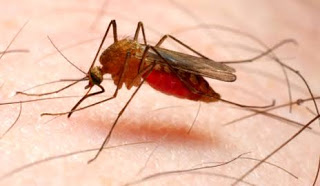
Global gains in the fight against malaria could be reversed unless
countries control the disease in conflict zones, where deaths and
infections are rising, experts said on Tuesday.
The number of
malaria cases worldwide increased in 2016 after 15 years of decline,
according to the World Health Organization (WHO).
malaria cases worldwide increased in 2016 after 15 years of decline,
according to the World Health Organization (WHO).
Africa accounts
for about nine in ten deaths and cases, with more than a third
concentrated in two countries – Nigeria and the Democratic Republic of
Congo – where conflict has forced millions to flee their homes, WHO data
shows.
for about nine in ten deaths and cases, with more than a third
concentrated in two countries – Nigeria and the Democratic Republic of
Congo – where conflict has forced millions to flee their homes, WHO data
shows.
Tackling malaria in such places requires new strategies
since those used elsewhere – such as distributing bed nets – do not
work, said Richard Allen, head of The Mentor Initiative, an organisation
focused on disease control in humanitarian crises.
since those used elsewhere – such as distributing bed nets – do not
work, said Richard Allen, head of The Mentor Initiative, an organisation
focused on disease control in humanitarian crises.
“All too
often we try to make the wrong tool fit the context,” Allen said in an
interview ahead of the Multilateral Initiative on Malaria’s (MIM)
pan-African conference this week.
often we try to make the wrong tool fit the context,” Allen said in an
interview ahead of the Multilateral Initiative on Malaria’s (MIM)
pan-African conference this week.
“Where is a displaced person going to hang a net?” he told the Thomson Reuters Foundation.
Researchers
presented possible solutions at the conference in Senegal’s capital
Dakar, such as insecticide-treated plastic sheeting that can be used for
shelters, and giving health workers mini malaria kits in a backpack.
presented possible solutions at the conference in Senegal’s capital
Dakar, such as insecticide-treated plastic sheeting that can be used for
shelters, and giving health workers mini malaria kits in a backpack.
/script>
(adsbygoogle = window.adsbygoogle || []).push({});
WHO’s
global malaria programme director, Pedro Alonso, said the right tools
were being used but noted that malaria surged in conflict zones for
other reasons.
global malaria programme director, Pedro Alonso, said the right tools
were being used but noted that malaria surged in conflict zones for
other reasons.
“Whenever there is an emergency, if the country is
endemic for malaria (then) disruption of health services, movement of
people and malnutrition … all lead to malaria,” he told the Thomson
Reuters Foundation.
endemic for malaria (then) disruption of health services, movement of
people and malnutrition … all lead to malaria,” he told the Thomson
Reuters Foundation.
Malaria killed twice as many people as Ebola
during West Africa’s Ebola crisis, and is responsible for the majority
of deaths in war-torn South Sudan and in parts of Nigeria battling Boko
Haram, Alonso said.
during West Africa’s Ebola crisis, and is responsible for the majority
of deaths in war-torn South Sudan and in parts of Nigeria battling Boko
Haram, Alonso said.
Global funding for the disease has levelled
off while populations have grown, meaning the amount of money per capita
to fight malaria in at-risk countries has dropped, he added.
off while populations have grown, meaning the amount of money per capita
to fight malaria in at-risk countries has dropped, he added.
Alonso said urgent action was needed.
“We either remain where we are or we start going backwards,” he said. (Thomson Reuters Foundation)











